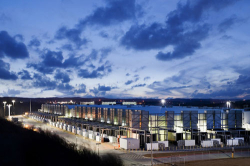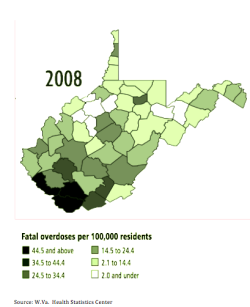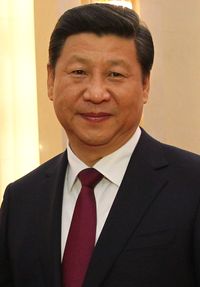
High-quality human capital consists of people who are educated, educable, and who are excited about what they are doing. They’re golden threads in the haystack of humanity. Put them together with a supportive environment and you get growth.
Since computing was invented the United States has been the leader in human capital. We attract it, we train it, and we deploy it better than anyone else.
Increase the percentage of high-quality human capital you have, in relation to the other kind, and your society can grow very quickly. Think Singapore or Hong Kong. Think Israel or great cities like London. If your cities or nation is a magnet for human capital, what Richard Florida called “the creative class,” wealth will be yours.

Clouds and devices change the equation, and we’re just starting to realize this. A smartphone is a supercomputer you hold in the palm of your hand, and a broadband cellular network can access clouds with ease. Suddenly an entrepreneur in Nairobi has access to the same infrastructure as someone in San Jose.
In 2017, with devices making clouds accessible to everyone, and with financial resources able to cross the globe at the speed of light, human capital is more important than ever.
Until very recently, no one could question America’s leadership in this area. But we have been frittering away that lead for decades.
We have let our education system atrophy, and control over it pass to fearful parents and ignorant preachers, who are teaching millions of American children flat-out lies.

Our success in the manufacturing era, when human capital meant less than financial capital, and in the resource era, when money came out of the ground, its value manipulated by a financial elite, its access controlled by our political and military elites, meant we could cover up the growing problem of human capital, hide it away.
We can’t do that anymore, and it is the greatest economic threat our nation faces.
The 2016 election means the minority which believes solely in manufacturing and resource capitalism now have control of all branches of our government. Technology took the support of government for granted for 70 years, and that support is entirely gone now.
Today’s government denies that climate change even exists. It denies the right of workers to organize, it denies the needs of human capital entirely. Just look at the returns. Those areas where human capital is most abundant voted Democratic. Those areas where it isn’t valued voted Republican. And the Republicans swept.
As I have written before, this is an existential threat to the technology industries which have been nurtured by our system of human freedom. The new Administration wants to close us off from access to imports of human capital, it seeks to balkanize the Internet resources that human capital needs to succeed, and it rejects support for education as elitist.

What technologists do in response to this will determine the history of the next generation. It could simply route around the blocks, moving headquarters to Asia, to Europe, maybe even to Africa, where it will be welcomed with tax breaks and political power. If we don’t value technology, the rest of the world certainly does. This is their chance.
Or, technology could do what the resource industries did a generation ago, and what the manufacturing industries did two generations ago. That is, fight back, and seize America’s politics.
This election resulted from the same demographic trends that gave a previous generation Jimmy Carter. Back then, it was the people of the New Deal who were still around, whose knees could still jerk in numbers large enough to elect a supporter of manufacturing over the party of resources. Today, it is the people of the Nixon era who have overstayed their welcome, and whose knees jerked in numbers large enough to elect supporters of the resource economy, who bemoan a “war against coal,” giving them complete power within our government.

In the late 1970s the oil industry organized, as it never had before. It created causes, it created think tanks, it backed like-minded academics and created entire schools of political thought dedicated to its interests. It destroyed Carter’s Democratic Party and has been at war with it ever since.
Technologists need to do the same thing to the Trump Party. Their effort may take different forms. I like what Steve Case was trying to do with his “Rise of the Rest” tour, which sought to extend Silicon Valley’s wealth to other cities and states. But most of what the industry did in the last year was desultory, and lacked any commitment.
That must change. Because there are plenty of places where human capital will be welcome, if it’s not welcome here. There’s a global “rest” that wants to rise, smartphones in hands, access to clouds guaranteed. The world is filled with cities, and those cities are filled with human capital, looking to take America’s power away from it.










Your post is great on human capital resources. Human capital is the major backbone for any company big or small. As they are the true people that drives the overall growth of the country.So, it is important to take human capital solutions in this regards to hire the best staff for organization.
Your post is great on human capital resources. Human capital is the major backbone for any company big or small. As they are the true people that drives the overall growth of the country.So, it is important to take human capital solutions in this regards to hire the best staff for organization.
The importance and productivity of human capital will soon receive a boost from the nonprofit Humaneering Technology Initiative (HTI), which has been developing an applied science that integrates research-based findings across the more than a hundred science disciplines that inform the optimal design and management of today’s post-industrial human work.
Humaneering synthesizes evidence-based knowledge relevant to human nature just as engineering has synthesized evidence-based knowledge relevant to physical nature. In practice, humaneering serves as an intermediary science that distills, synthesizes, and field-validates research-based knowledge for convenient application by individuals and organizations to maximize human capital development, utilization and performance. When released, humaneering, similar to engineering, will be institutionally maintained in the public domain for free access.
Without humaneering, engineering has since the Industrial Era been unwittingly used not only for its intended purpose (e.g., design of physical structures like bridges, buildings, machines, physical materials, etc.), but also for designing predominantly human systems, and doing so without much appreciation for human nature (e.g. work space, organization structure, work role, performance management, etc.), a practice that becomes less effective and less tolerable every decade since the Industrial Era.
HTI is opening its first public website in February 2017. Already available from the placeholder webpage are two article reprints detailing the backstory on humaneering’s development. These will be informative to anyone with interest in human capital. https://HumaneeringTech.com
The importance and productivity of human capital will soon receive a boost from the nonprofit Humaneering Technology Initiative (HTI), which has been developing an applied science that integrates research-based findings across the more than a hundred science disciplines that inform the optimal design and management of today’s post-industrial human work.
Humaneering synthesizes evidence-based knowledge relevant to human nature just as engineering has synthesized evidence-based knowledge relevant to physical nature. In practice, humaneering serves as an intermediary science that distills, synthesizes, and field-validates research-based knowledge for convenient application by individuals and organizations to maximize human capital development, utilization and performance. When released, humaneering, similar to engineering, will be institutionally maintained in the public domain for free access.
Without humaneering, engineering has since the Industrial Era been unwittingly used not only for its intended purpose (e.g., design of physical structures like bridges, buildings, machines, physical materials, etc.), but also for designing predominantly human systems, and doing so without much appreciation for human nature (e.g. work space, organization structure, work role, performance management, etc.), a practice that becomes less effective and less tolerable every decade since the Industrial Era.
HTI is opening its first public website in February 2017. Already available from the placeholder webpage are two article reprints detailing the backstory on humaneering’s development. These will be informative to anyone with interest in human capital. https://HumaneeringTech.com
Readers interested in learning more about “humaneering” will find the Humaneering Technology Initiative’s website now features a quick executive briefing (3-min read) on humaneering technology (i.e., why, what, how) and a related opportunity for executives to get “early access” while humaneering’s development continues. See https://HumaneeringTech.com
Readers interested in learning more about “humaneering” will find the Humaneering Technology Initiative’s website now features a quick executive briefing (3-min read) on humaneering technology (i.e., why, what, how) and a related opportunity for executives to get “early access” while humaneering’s development continues. See https://HumaneeringTech.com